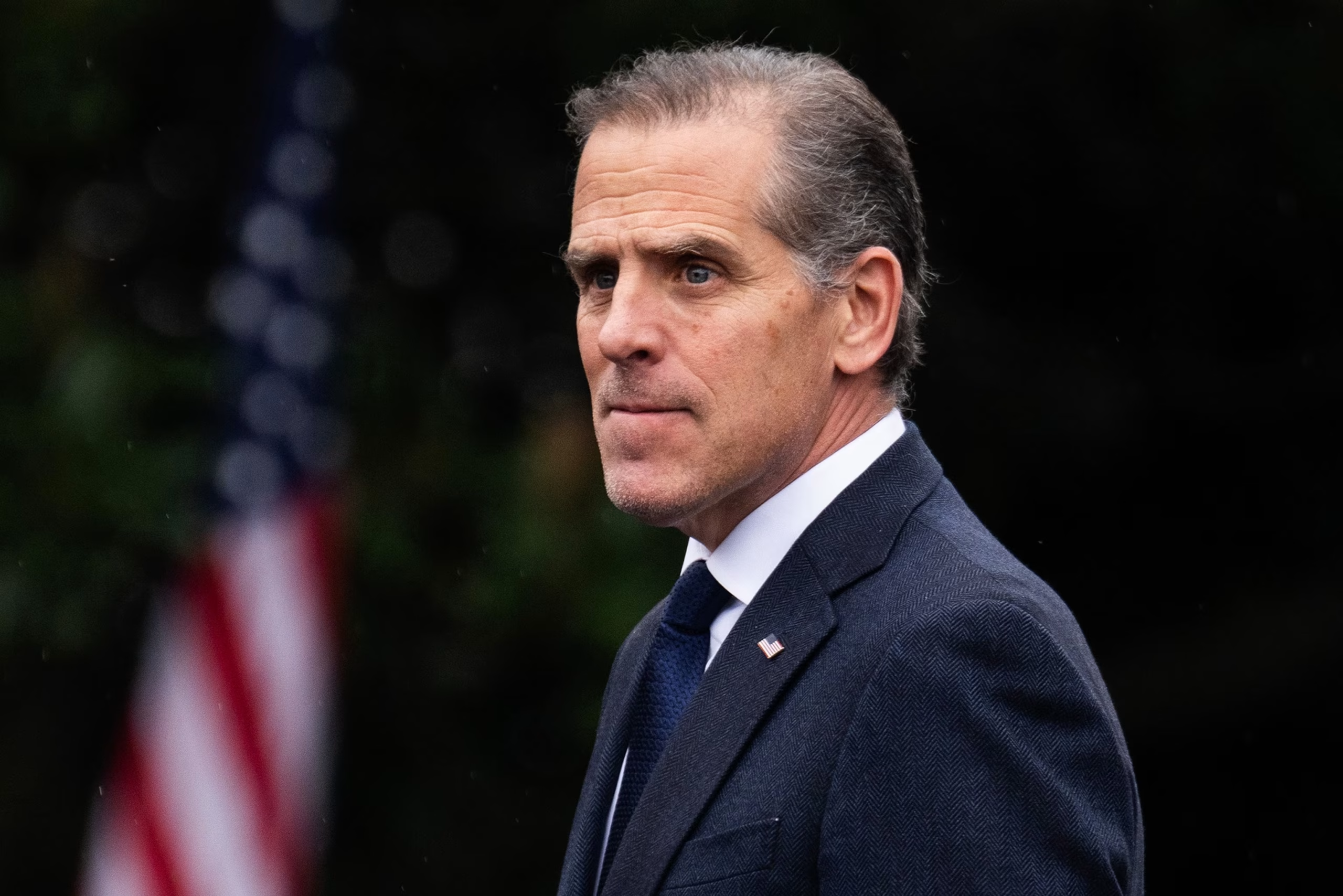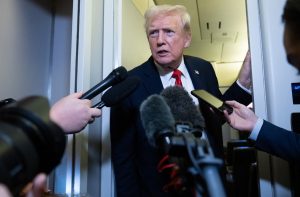Hunter Biden, son of President Joe Biden, is facing widespread criticism following a highly contentious appearance on a podcast in which he directed profane personal attacks at journalist Miranda Devine. The remarks, which were widely circulated on social media and news outlets, have prompted debate about public conduct, journalistic freedom, and the heightened scrutiny that accompanies the Biden family’s ongoing legal and political challenges.
The incident took place during a November 6 appearance on the Wide Awake Podcast, where Hunter Biden discussed a range of topics, including ongoing commentary surrounding his personal and professional life. During the conversation, Biden targeted Devine, a New York Post columnist who has covered his family’s financial and business activities for several years. According to multiple reports, Biden referred to Devine in highly offensive terms, criticizing both her appearance and her journalistic integrity.
Devine is recognized for her early reporting on the contents of a laptop abandoned by Hunter Biden in 2020, which included emails, business records, and personal messages. Her coverage of the laptop and related matters, later detailed in her book Laptop from Hell, highlighted the Biden family’s financial connections to entities in China, Ukraine, and other countries. These revelations drew attention from congressional investigators and federal prosecutors and have remained a significant component of public discourse surrounding Hunter Biden’s business dealings.
During the podcast, Biden reportedly did not dispute the substance of Devine’s reporting. Instead, he directed his comments toward her personally, asserting that individuals covering his family’s activities are motivated by financial gain rather than journalistic ethics. In his remarks, he allegedly said, “There’s no ethics in what, you know, like someone as horrendously ugly as Miranda Devine physically and in terms of her ethics does. They’re whores for money. And when she goes to sleep at night, I’m sure she sleeps just fine. But I don’t know anybody that is going to be mourning her when she’s gone.”
The remarks immediately drew condemnation from across the political spectrum. Critics described the comments as deeply inappropriate, emphasizing that public figures, regardless of personal grievances, bear a responsibility to engage in civil discourse. Media analysts noted that such personal attacks are designed to humiliate and intimidate rather than engage substantively with the issues being reported.
Devine herself responded to Biden’s comments with restraint, posting on social media that his remarks were indicative of an inability to address the facts she had reported. She stated, “Classy guy. Clearly, he can’t find anything inaccurate in what I’ve reported.” Observers have interpreted her response as a measured acknowledgment that the attack was personal, rather than an attempt to refute her work.
Hunter Biden’s remarks come amid heightened legal and political scrutiny. He continues to face federal investigations related to alleged tax violations, unregistered foreign lobbying, and potential false statements concerning a firearm purchase. Congressional Republicans have also publicly released bank records and other documentation linking entities associated with Hunter Biden to significant foreign payments, including transfers from Chinese and Ukrainian nationals, during the period when Joe Biden served as Vice President.
The laptop and related reporting, once dismissed or downplayed by certain media organizations, has since been corroborated in multiple respects. Major outlets have verified portions of the materials originally published by Devine and others, and congressional hearings have examined the ways in which social media platforms initially restricted or labeled coverage of the story. While former intelligence officials suggested in 2020 that the laptop may have been part of a disinformation campaign, subsequent verification by the Federal Bureau of Investigation confirmed the authenticity of much of its content.
Commentators have highlighted the broader implications of Hunter Biden’s remarks for discussions surrounding public accountability and the conduct of high-profile figures under scrutiny. By targeting a journalist personally, rather than addressing questions about financial dealings or reporting accuracy, Biden’s actions raise concerns about attempts to deflect criticism through ad hominem attacks. Media watchdogs and free press advocates have emphasized the potential chilling effect such behavior may have on investigative reporting.
Beyond the personal nature of the remarks, the incident illustrates the ongoing intersection of political controversy and media coverage. Devine’s reporting has consistently focused on issues involving transparency, international business dealings, and potential conflicts of interest. Hunter Biden’s response, characterized by some analysts as emotionally charged and profane, underscores the intense pressure associated with public life for members of the first family, as well as the amplified scrutiny of statements made in media appearances.
Legal experts and commentators have also noted that public figures often face heightened obligations when interacting with journalists, particularly when the topics under discussion involve ongoing investigations or sensitive personal matters. While freedom of expression protects Biden’s ability to speak publicly, ethical considerations in journalistic and political discourse suggest that personal attacks undermine constructive engagement and public confidence in accountability mechanisms.
Observers point to several factors contributing to the escalation of this incident. First, the topic itself—Biden’s overseas business dealings and the contents of the laptop—remains politically and legally sensitive, with continuing interest from investigators and policymakers. Second, the public medium, a widely distributed podcast, amplified the remarks and ensured rapid dissemination to a large audience. Third, the prior history of coverage by Devine, including her documented investigative reporting, provided a foundation for the tension between the journalist and the public figure.
The reaction to the remarks has been multifaceted. Supporters of Devine emphasize the importance of holding public figures accountable for threats or disparaging language directed at journalists. Critics of Biden’s remarks have characterized them as inappropriate for someone of his public prominence, noting the potential for personal attacks to escalate into broader harassment or intimidation.
Some political commentators have contextualized the remarks within the broader landscape of Hunter Biden’s personal and legal challenges. They argue that the combination of ongoing investigations, public scrutiny, and sustained media attention can contribute to emotionally charged responses. However, these factors do not absolve the use of vulgar language or personal attacks, particularly when directed at members of the press engaged in reporting that has been verified and substantiated over time.
Hunter Biden’s podcast appearance highlights a larger pattern observed among high-profile individuals navigating complex political and personal controversies. Public figures frequently face intense media scrutiny, and the pressures of accountability, combined with the amplified reach of digital platforms, can lead to impulsive or inflammatory statements. Nonetheless, professional and ethical standards suggest that public figures should address criticism with evidence-based responses rather than personal invective.
For her part, Devine has maintained a measured stance, continuing to highlight the substance of her reporting rather than responding in kind to the personal attacks. She has consistently emphasized investigative transparency, documenting her findings regarding financial records, international transactions, and the broader implications of the information revealed on the laptop. Her approach has reinforced the distinction between personal animosity and the journalistic mission to report verified information in the public interest.
The incident has prompted broader discussions about the relationship between public figures, investigative journalists, and the dissemination of information in the digital age. Social media platforms and podcasts provide direct channels of communication to vast audiences, but they also magnify the potential impact of contentious remarks. Hunter Biden’s comments exemplify how personal attacks can quickly dominate coverage, potentially overshadowing substantive discussions about policy, legality, or ethics.
Ethics analysts have underscored the importance of accountability and proportionality in public discourse, particularly for individuals with high visibility and influence. When remarks are personally insulting or inflammatory, they can detract from constructive debate and create an environment in which threats or harassment may proliferate. In this case, Hunter Biden’s remarks directed at Miranda Devine have drawn attention precisely because of the combination of profane language, personal targeting, and the broader context of ongoing legal and political scrutiny.
As the discussion continues, legal and political observers are likely to monitor both the impact of these remarks and the ongoing investigations into Hunter Biden’s financial and business activities. The incident may have implications for public perception, media relations, and the broader debate over transparency and accountability in government-affiliated and private business dealings.
In addition to the broader public and political reactions, the incident underscores the enduring relevance of investigative journalism in exposing and analyzing high-profile matters of public interest. Despite personal attacks, journalists such as Miranda Devine continue to report on complex financial and political matters, emphasizing verification and sourcing. Her work illustrates the ongoing role of investigative reporting in holding powerful individuals accountable, even in the face of personal criticism or hostility.
The controversy surrounding Hunter Biden’s remarks serves as a reminder of the delicate balance public figures must maintain when discussing journalists and media coverage. While freedom of expression remains a cornerstone of public discourse, ethical standards and professional conduct are critical to maintaining credibility, public trust, and the integrity of political and journalistic institutions.
In summary, Hunter Biden’s podcast appearance and the ensuing remarks toward journalist Miranda Devine have generated significant attention and debate. The episode underscores issues of personal conduct, media scrutiny, and the responsibilities of public figures under heightened public observation. While legal and political ramifications continue to unfold, the incident highlights ongoing tensions between investigative journalism and prominent public figures, as well as the ethical and practical considerations associated with public discourse in contemporary media environments.

Emily Johnson is a critically acclaimed essayist and novelist known for her thought-provoking works centered on feminism, women’s rights, and modern relationships. Born and raised in Portland, Oregon, Emily grew up with a deep love of books, often spending her afternoons at her local library. She went on to study literature and gender studies at UCLA, where she became deeply involved in activism and began publishing essays in campus journals. Her debut essay collection, Voices Unbound, struck a chord with readers nationwide for its fearless exploration of gender dynamics, identity, and the challenges faced by women in contemporary society. Emily later transitioned into fiction, writing novels that balance compelling storytelling with social commentary. Her protagonists are often strong, multidimensional women navigating love, ambition, and the struggles of everyday life, making her a favorite among readers who crave authentic, relatable narratives. Critics praise her ability to merge personal intimacy with universal themes. Off the page, Emily is an advocate for women in publishing, leading workshops that encourage young female writers to embrace their voices. She lives in Seattle with her partner and two rescue cats, where she continues to write, teach, and inspire a new generation of storytellers.









